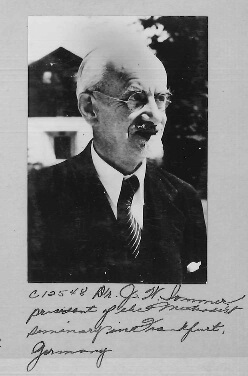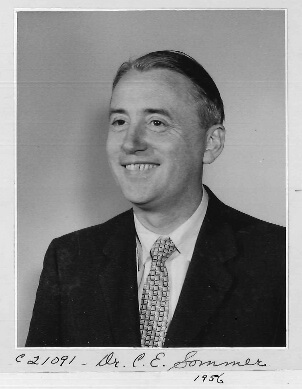Methodist Educators, Relief Leader, Bishops

Board of Missions of the Methodist Church , “Mission Photograph Album - Portraits #06 Page 118,” UMC Digital Galleries, accessed November 27, 2018, http://catalog.gcah.org/omeka/items/
show/60442.
J. W. Ernst Sommer was born to a German Wesleyan minister father and British mother in Germany. He went to Kingswood, Cambridge University, and the university at Lausanne for his education. He taught in London and married a Briton, Beatrice Dibben. From 1907 to 1912, he was a missionary in Turkey. On his return to Germany, he became dean of a missionary training college, then professor of Old Testament and Ethics at Frankfurt Methodist Theological Seminary. He became president in 1936 and was elected bishop by the Germany Central Conference in 1946. During the war, he refused to release rooms for the use of the National Socialist Party, saying that he needed them for the student body, which consisted of a single Bulgarian student, Zdrako Beslov. While serving as president of the seminary, he continued to pastor a circuit.
He was responsible for coordination relief work in Germany after the Second World War. He wrote graphically about the damage incurred by the church during the war, both the destruction of buildings and the physical and spiritual demoralization of humans. His attitude remained positive and hopeful. He emphasized the possibilities for evangelism and the church’s witness in numbers and influence. He also led the church to maintain relations with those under Communist domination in the East. The church built houses near Lubeck for refugees from East German. He also worked with Martin Niemöller in the Cooperative Fellowship of Christian Churches in Germany, a Protestant organization. Sommer died in 1952.

Board of Missions of the Methodist Church , “Mission Photograph Album - Portraits #10 Page 0011,” UMC Digital Galleries, accessed November 27, 2018, http://catalog.gcah.org/omeka/items
/show/61098.
His son, C. Ernst Sommer, was born in 1911 in Turkey. He received his education in Germany and served in the Germany army in France and North Africa during the Second World War. He became professor of Christian education and church history at the Frankfurt Methodist Theological Seminary in 1950 and wrote extensively on the Bible and church history as well as serving as a member of the Methodist General Conferences of 1964, 1966, and 1968. He was elected bishop by the Germany Central Conference in 1968, becoming the first bishop elected by a central conference of the new United Methodist Church. He died November 7, 1981.
Taken from Linda Gesling, Mirror and Beacon: The History of Mission of The Methodist Church, 1939-1968. (New York: General Board of Global Ministries, The United Methodist Church, 2005), p. 96.




